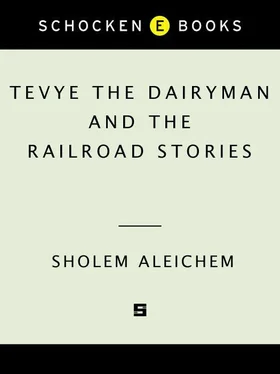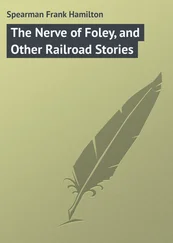That same day, a few hours after the splendid wedding, I harnessed my horse to the wagon and the three of us, myself, my daughter, and my heir-in-law, piled into it and drove to Boiberik. As I sat there stealing a glance at them, I thought, how clever it is of God to run His world according to the latest fashions! And the weird types He puts in it! Why, right next to me was a freshly married couple, still wet behind the ears, so to speak, one of them setting out for the Devil knows where and the other not shedding a tear for him, not even one for the record — but Tevye was no woman, Tevye would wait and see … At the station were a few youngsters, born-and-bred Kasrilevkites to judge by the state of their boots, who had come to say goodbye. One, wearing his shirt down over his pants and looking more like a Russian than a Jew, stood whispering with my wanderbird. I do believe, Tevye, I told myself, that you’ve married into a gang of horse thieves, or purse snatchers, or housebreakers, or at the very least, highway murderers …
On the way back from Boiberik I couldn’t restrain myself any longer, and I told my Hodl what I thought of them. She laughed and tried explaining to me that they were the best, the finest, the most honorable young people in the world, and that they lived their whole lives for others, never giving a fig for their own skins. “For example,” she says, “that one with the shirt hanging out: he comes from a rich home in Yehupetz — but not only won’t he take a penny from his parents, he refuses even to talk to them.”
“Is that a fact?” I say. “I do declare, honorable is hardly the word! Why, with that shirt and long hair, all he needs is a half-empty bottle of vodka to look the perfect gentleman.”
Did she get it? Not my Hodl! Eyn Esther magedes —see no evil, hear no evil. Each time I took a dig at her Peppercorn’s friends, back she came at me with capital, the working class, pie in the sky. “What do I care about your working class,” I said, “if it’s such a military secret? There’s an old saying, you know, that if you scratch a secret, you’ll find a thief. Tell me the truth, now: where is Peppercorn going and why is he going there?”
“Ask me anything but that,” she says. “Better yet, don’t ask me anything. Just pray that there’ll be some good news soon …”
“Amen,” I say. “I only hope God’s listening. My enemies should worry about their health as much as I’m beginning to worry about the little game that you and your friends are playing …”
“The trouble is, you don’t understand,” she says.
“What’s to understand?” I say. “I’d like to think I understand harder things.”
“It’s not something you can grasp with just your head,” she says. “You have to feel it — you have to feel it with all your heart!”
And on she went, my Hodl, her face flushed and her eyes burning as she talked. What a mistake it was to go and have such daughters! Whatever craziness they fall for, it’s head and heart and body and soul and life and limb all together …
Well, let me tell you, a week went by, and then another, and still another, and another, and another— eyn koyl ve’eyn kosef , there’s not a letter, not a single word. That’s the last of Peppercorn, I thought, looking at my Hodl. There wasn’t a drop of blood in her poor cheeks. All the time she did her best to keep busy about the house, because nothing else helped take her mind off him — yet couldn’t she have said something, couldn’t she at least have mentioned his name? No, not one syllable: you’d think that such a fellow as Peppercorn was a pure figment of my imagination …
One day when I came home, though, I could see that my Hodl had been crying; her eyes were swollen with tears. I asked around and was told that not long before, a character with long hair had been in the house and spoken to her in private. Oho, I said to myself, that must be our fine friend who goes about with his shirt hanging out and tells his rich parents to jump in the lake! And without thinking twice I called my Hodl out to the yard and put it straight to her. “Tell me,” I asked her, “have you heard from him?”
“Yes,” she said.
“And where,” I ask, “is your true love?”
“He’s far away,” she says.
“And what,” I ask, “might he be doing there?”
“He’s doing time,” she says.
“Time?”
“Time.”
“But where?” I ask. “For what?”
Hodl didn’t answer. She looked straight at me and said nothing.
“Just explain one thing to me, Daughter,” I said. “I don’t need you to tell me that he’s not doing time for horse theft. And if he isn’t a thief and he isn’t a swindler, what good deeds has he been put away for?”
Eyn Esther magedes —mum’s the word! Well, I thought, if you don’t want to talk, you don’t have to; he’s your bit of bad luck, not mine; may the Lord have mercy on him!.. My heart didn’t ache any less, though. After all, she was my daughter. You know what it says in the prayer book: kerakheym ov al bonim —a father can’t help being a father …
In short, the summer passed, the High Holy Days came and went, and it was already Hoshana Rabbah, the last day of Sukkos. It’s my habit on holidays to give myself and my horse a breather, just like it says in the Bible: atoh —you yourself; veshorkho —and your wife; vekhamorkho —and your horse too … Besides, there’s nothing to do then in Boiberik anyway; as soon as Rosh Hashanah comes along, all the dacha owners take off like a pack of hungry mice and Boiberik turns into a ghost town. It’s a good time to stay home and relax a bit on the front stoop. In fact, it’s my favorite season. Each day is a gift. The sun’s not as hot as an oven anymore and has a mildness about it that makes being out-of-doors a pleasure. The leaves are still green, the pine trees give off a good tarry smell, and the whole forest is looking its best, as if it were God’s own sukkah, a tabernacle for God. It’s there that He must celebrate the holiday, not in the city, where there’s such a commotion of people running about to earn their next meal and thinking only of money, of how to make more and more of it … And at night you might think you were in Paradise, the sky such a deep blue and the stars twinkling, sparkling, winking on and off at you like eyes; sometimes one shoots through the air as fast as an arrow, leaving behind a green trail — that’s a sign that someone’s luck has run out. Every Jew has his star … why, the whole sky is Jewish … I hope it’s not mine that just fell, I prayed, suddenly thinking of Hodl. Lately she’d seemed cheerier, livelier, more her old self again. Someone had brought her a letter, no doubt from her jailbird. I would have given the world to know what was in it, but I was blamed if I was going to ask. If she wasn’t talking, neither was I; I’d show her how to button up a lip. No, Tevye was no woman; Tevye could wait …
Well, no sooner had I thought of my Hodl than she appeared by my side. She sat down next to me on the stoop, looked around, and said in a low voice, “Papa, are you listening? I have to tell you something. I’m saying goodbye to you tonight … forever.”
She spoke in such a whisper that I could barely hear her, and she gave me the strangest look — such a look, I tell you, as I’ll never forget for as long as I live. The first thing to flash through my mind was that she was going to drown herself … Why did I think of drowning? Because there was once an incident not far from here in which a Jewish girl fell in love with a Russian peasant boy, and, not being able to marry him … but I’ve already told you the end. The mother took it so hard that she fell ill and died, and the father let his business go bankrupt. Only the peasant boy got over it; he found himself another and married her instead. As for the girl, she went down to the river and threw herself in …
Читать дальше












